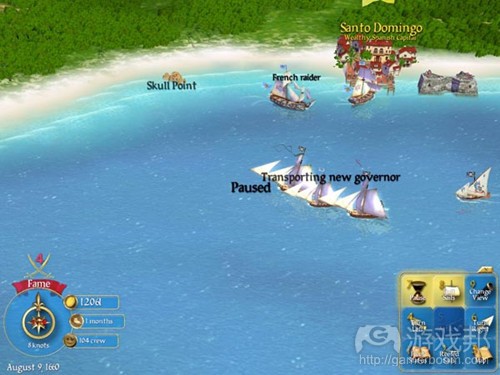《Sid Meier’s Pirates!》吸引人的六大原因
作者:Thomas Henshell
“优秀的艺术家会选择复制,而伟大的艺术家会选择窃取。”—-毕加索
《SidMeier’sPirates!》可能算得上是最重要的一款游戏,我花了大量的时间去玩这款游戏。现在我正致力于《Archamage Rises》,而我对于这款游戏的部分电梯游说内容便是“这就像是带有魔法师和永久死亡设置的《Pirates!》。”
我和《Pirates!》已经认识彼此好长一段时间。自从我将我的360KB的5.25英尺软驱放进我的Tandy 1000并运行它已经过了27年。我有一阵子未去接触它,直到本周日,我打开了游戏的2004版想看看它能够带给我什么启示。(游戏邦注:小时候我都不能在周末看电视,所以我便可以借此在游戏中自由地当一名“海盗”。)Firaxis的2004版便是重创早前游戏的内在优势去适应现代用户需求的有效例子。如果你玩了2004版,你通常也玩过87版,反之亦然。
以下是本周我所学到的对自己有帮助的内容,希望对你们也能够起到帮助:
与任何创造性项目一样,游戏设计/概念是源自一个清晰的灵感。在碰触键盘前我能够清楚地看到自己到底想要创造怎样的游戏。但就像独自处在风浪交错的开放海域的船只一样,游戏开发过程也会不断漂移。编程,美术选择,新功能等等所有决定都有可能偏移游戏的核心概念。我是独自一个人!所以我不能想象带有无数充满才能的开发者的AAA级团队是怎么做到这个的。
所以当我在War Sloop中作为一名荷兰人航行于加勒比海时,我遭遇了与《Archmage Rises》中完全不同的漂移。对于某些我需要做出的航线修改我真的感到很失望,但我却非常满足游戏的整体体验。
与Neo一样,Sid也为我们呈现了通向真正开放世界设计的方法
我清楚地写下了《Pirates!》可能是最重要的一款游戏。这是本周我的一个开发者朋友跟我说的,一开始我觉得这是一种荒谬的想法。但之后我意识到这一点都没错!
《Pirates》是世界上第一款开放世界游戏,并且是4种不同类型游戏的组合。我听到许多人将《侠盗猎车手III》称为“第一款”开放世界游戏—-但从创造性来看,它是比不上《Pirates》的。让我们来看看原因:
1.逼真的世界
不管有没有你的参与,《Pirates!》的游戏世界都很逼真。它模拟了整个加勒比海经济。欧洲列强将在这里相抗衡。城镇会遭遇发展与衰败。突击者或入侵者将摧毁城镇。城镇会因为模拟战争发生改变。州长的替换带动了经济的发展。有名的海盗(NPC)在世界各地周游,并创造了破坏。即使出发点一样的两款游戏也不会完全一样。
一个特殊的例子:一艘商船从圣胡安行驶到圣基茨岛,不管是出发港还是到达港的经济都会受到推动。如果船只在海上遇难,那么这两个港口也都会遭遇损失。城镇的经济发展决定了你能够获得多少钱去购买货物,以及能够出售/交易哪些商品。
在沙盒中是不存在中立的行动。不管你做什么,游戏世界都会发生相应的改变。
2.突发行为
《Pirates!》带有一些非常简单的规则。但这却是适当的规则—-所以伴随着所有模拟代理,你的突发行为也拥有了合理的存在理由。
我愉快地航行着,什么人都没看到,除了两个分别来自不同地方并同时朝着一座西班牙城镇发射大炮的法国人。我想不管是我还是开发者都不会预料到两个来自不同城镇的人会在我经过的时候同时朝着同一座城镇发动攻击。
同时,我决定攻击一辆特别的船只—-但当我到达那里时,它却非常靠近城镇了。所以我的海战便变成了海陆战—-这都取决于船只离开港口的时间。我们的路线交叉在一起,我不得不处理这些结果。
3.永久存在
当你抢夺船只时,城镇的经济也会受到影响。如果你支持其中的一个欧洲列强,它将控制你的加勒比海领域。你可以通过放手城镇或促使强大的运输船沉入海底而帮助城镇不断从一个国家转手到另一个国家。不管怎样每一种行动都带有持久的结果以及“我做到了这个!”的深刻感受。
这种存在感将在地图上不断加强。它呈现了你的行动在游戏世界中所发生的地点与时间。这是你在加勒比海域的故事;这是个人的故事。也是吸引我不断回到游戏中的元素。
4.不同效果
考虑到你只能作为海盗,所以基于限定类型的游戏拥有着各种不同的游戏风格。
首先,如果你属于行动导向型,你便能够通过掠夺船只并与船长战斗而赚钱。但如果你更有商人头脑,你便能够汇聚一大群商船并作为一个商人从一些注重生产的小城镇航向注重消费的大城镇。
你可以占领并控制游戏中的每一艘船。也就是你可以选择入侵一艘12枪的单槐帆船或者48枪护卫舰。做出不同选择所使用的战术也是不同的。
获得财产并与统治者的女儿结婚。反复做这样的事!这是我所知道的少数允许一夫多妻制的游戏。
5.程序生成任务
逼真的游戏世界充分利用了基于现状的游戏生成任务。
一艘运载着珍宝的船只上的酒吧女侍将前往附近的岛屿。或者一位控制者希望你陪同新统治者前往他所要到达的目的地。旅行者将卖掉藏宝图。
当我认为这些内容会不断重复时,我发现它们比《Destiny》的任务更吸引人。可能是因为如果我能成功护送统治者,世界就会彻底发生改变。而在《Destiny》中,当我下次射击时Vex仍会出现在那里。
6.意外故事
2004版的《Pirates!》带有一个再生/为你那被绑架的家人报仇的故事。你可以完成这一任务或彻底忽视它。
待在我自己创造的故事中会更有趣。我是作为一个将与西班牙人协商的荷兰人。有时候我会给北方带来灾害,有时候则是南方。有时候我将选择一个城镇并阻碍它获得外部货物,或平衡地扩散我自己的控制统治。
游戏的简单规则和逼真的世界让我能够创造自己的故事并体验能够打动内心的内容。在这里比我聪明的人将其称为从“游戏”到“软件玩具”的转变。这似乎是Sid游戏中常见的思路,这也是这些游戏能够经得住时间考验的原因。
窃取好的的内容
毕加索真正想传达的是什么?他提到了内在化艺术品的概念或类型,而不仅仅只是复制。复印件和记忆是完全不同的。就像在编程时,我们可能拥有同样的理念,但是表现出来的可能是肤浅复制vs深度复制。
当我说我自己正在制作带有魔法师的《Pirates!》时意味着什么?
我并不是说我在创造一款带有魔法师不断攻击商队去讨好统治者并与他的女儿结婚的3D地图的游戏。对于我来说这是一种肤浅复制。
我是在执行上述所提到的6大设计核心。我的大多数努力是专注于创造一个真是可信且活灵活现的幻想RPG世界。在这里贵族(也就等于统治者)将带有个性和野心。他们将根据其领域以及邻居身边发生的事去生成任务。作为玩家的你将决定想要支持哪个贵族以及想要在谁身上测试你的Fire Rain咒语。我在这里所谈论的是Sid做了什么以及我们该如何进一步使用他的方法。你拥有一个基地(你的魔法师塔),并且根据你的名声,贵族将派遣入侵者去攻击你!所以你的表现将影响你的个人安全。这是玩家在游戏中感受到存在感与永久性的一种方法。最终,我想要提供给玩家去传达自己的故事的能力。我希望借此能够推动我的游戏的成功并让更多人愿意不断回到游戏中。
我的确是在窃取别人的内容。但这却是基于正面意义。
(本文为游戏邦/gamerboom.com编译,拒绝任何不保留版权的转功,如需转载请联系:游戏邦)
Looting Game Design Gold from *Sid Meier’s Pirates!*
by Thomas Henshell
“Good artists copy, great artists steal.” – Pablo Picasso
Sid Meier’s Pirates! is arguably the most important game ever made . . . and it also ruined my week. You see, I’m working on Archmage Rises—and part of my elevator pitch is, “It’s like Pirates! but with mages and permadeath.”
“Live the Life” is exactly what this Pirate simulator delivers!
Pirates! and I have known each other a long time. It’s been 27 years since I slipped my 360 KB 5.25″ floppy into my Tandy 1000 and “Lived the Life.” Having not played it for a while, just this Sunday I fired up the 2004 edition to see what it could teach me. (I grew up in a culture that didn’t watch TV on Sunday, so I revel in the freedom of being a pirate on the Lord’s Day!) The 2004 edition by Firaxis is a great example of how an old game’s inner beauty can be recast for a modern audience. If you’ve played the 2004 version, you’ve basically played the ’87 version—and vice versa.
What I learned this week is valuable to me, and hopefully to you:
Like any creative project, a game design/concept is born in a lucid moment of inspiration. I can literally see the game I want to make before I’ve touched a keyboard. But like a ship on the open seas with wind and waves, the game development process includes drift. Programming, art choices, new features, all the little decisions along the way potentially introduce drift one away from the core concept of the game. And I’m one guy! I can’t imagine how AAA teams do it with dozens (or hundreds!) of talented developers.
So as I sailed the Caribbean as a Dutchman in a War Sloop, I was confronted in stark contrast with how much drift has already occurred in Archmage Rises. I’m disappointed in some of the course corrections I need to make, but I’m happy overall with the experience.
Like Neo, Sid showed us the way toward true open world design
I glibly wrote that Pirates! could be the most important game ever made. It is something a game developer friend said to me this week—and at first, I felt this was a ridiculous thought. Later on, I realized he may be right after all!
Pirates is one of the world’s first open world games and yet a mashup of four different types of games. I hear many people pay tribute to Grand Theft Auto III as the “first” open world game—but for all of Rockstar’s inventiveness, they’ve got nothing on Pirates. Let me explain why:
Gold Chest #1: Living World
The game world of Pirates! is alive and hums along with or without your involvement. A whole Caribbean economy is simulated under the hood. European powers go to war with one another. Towns grow or decrease in prosperity. Raiders or invasion forces decimate towns. Towns change hands through simulated battles. Governors get replaced bringing economic prosperity. Famous pirates (NPCs) travel the world, causing havoc. From the same starting point, no two games are the same.
One specific example: Should a trade ship traveling from San Juan to St. Kitts arrive, both the sending port and receiving port get a small economic boost. If the ship is lost at sea (or to you), they both suffer that loss. The economic prosperity of the towns determines how much money they have to buy your goods, and which items are available for sale/trade.
There are no neutral actions you can take in the sandbox. Whatever you do, the world will change accordingly.
Gold Chest #2: Emergent Behavior
Pirates! has a few very simple rules at play. But it has the right rules—so with all the simulated agents, you have the right ingredients for emergent behavior.
I was merrily sailing along and saw not one, but two separate French raiders sally up to a Spanish town and let loose their canons. No one, from me to the developers, could have predicted that two raiders sent from different towns would happen to attack the same town at the same time just as I was sailing by.
Similarly, I decided I wanted to attack a particular ship—but by the time I got there, it was close to town. So my sea battle became a land and sea battle—all because of the timing of when that ship left its port. Our paths converged, and I had to deal with the consequences.
Gold Chest #3: Permanent Presence
As you loot ships, the economies of the towns are impacted. If you favor one European power, it will dominate your version of the Caribbean. You can help towns permanently change hands from one nation to another by sacking the town or sinking reinforcement troop ships. Each action has a lasting consequence and a profound feeling of “I did that!”
Presence is reinforced through the map/log. It shows where and when every one of your actions took place in the world. This is your story in the Caribbean; it is personal. This is what keeps me coming back over and over again.
Gold Chest #4: Different Strokes
Given you can only play as a pirate, the game has a wide variety of play styles within a seemingly confining genre.
First, if you are more action-oriented, you can make money by looting ships and entering sword fights against ship captains. But if you are more merchant-minded, you can amass a large fleet of trade galleons and become a merchant trader of sorts sailing from smaller producing towns to larger consuming towns. In a small way, it has a bit of Railroad Tycoon in here. ![]()
Every ship in the game can be captured and controlled by you. So you can play a small fast raider in a 12 gun sloop, or a massive lumbering 48 gun Frigate. The battle tactics are entirely different.
You can staunchly play for King and Country of your starting European power. Or a heartless, opportunist smuggler playing all sides against each other. And anything in between.
Get estates and get married to a governor’s daughter. Even do it multiple times! It’s one of the only games I know of that allows polygamy.
Gold Chest #5: Procedurally-Generated Quests
The living game world is fully utilized as the game generates quests based on current conditions.
A barmaid whispers of a certain treasure laden ship traveling to a nearby island. Or a governor asks you to escort a new governor to his destination. A traveller is willing to sell a treasure map to buried treasure.
While I suppose these can become eventually repetitive, I find them far more engaging than Destiny’s quests. Probably because if I do successfully escort that governor, the world permanently changes. In Destiny, the Vex will still be there the next time I shoot them—and the next, and the next after that.
Gold Chest #6: Emergent Story
The 2004 version of Pirates! has a story of recovering/avenging your kidnapped family. You can complete this or completely ignore it.
I’m more interested in the stories I make myself. ![]() I play as a Dutchman with a score to settle with the Spanish. Sometimes I’m the scourge of the north, or the south. Sometimes I’ll pick on a town barricading it from all outside shipments, or spread my reign of terror evenly.
I play as a Dutchman with a score to settle with the Spanish. Sometimes I’m the scourge of the north, or the south. Sometimes I’ll pick on a town barricading it from all outside shipments, or spread my reign of terror evenly.
The game’s simple rules and living world allow me to make up my own stories and play them out to my heart’s content. This is where people smarter than me have identified it as moving from “game” to “software toy.” This seems to be a common thread in Sid’s games, and why they stand the test of time.
You can also play Pirates! on pretty much anything, which is awesome. If you haven’t played this gem, you are in luck!
Pirates! is available on just about everything except WonderSwan:
iPad, iPhone, Windows Phone, Windows XP+, Xbox 360, Xbox, Wii, PSP, Windows 3.x, Sega Genesis, Amiga/CD32, Apple II/IIGS, Atari ST, NES, Commodore 64, Dos, Macintosh, Amstrad CPC, NEC PC-9801
Steal Good. Copy Bad
What was Picasso talking about, really? He was referring to internalizing the concept or style of a work of art, not merely copying it. It’s the difference between a photocopy and a memory. In programming, we have a similar idea in the form of shallow copy versus deep copy.
So what do I mean when I say I’m making Pirates! with mages?
I do not mean having a 3D map with a mage running around attacking merchant caravans to impress governors and marry their daughters. To me, that would be a shallow copy.
I am implementing the six gold chests of design above in spirit. Most of my effort is focused on creating a plausible, living and breathing fantasy RPG world. One where nobles (my equivalent of governors) have personalities and ambitions. They procedurally generate quests based on what is happening in their territory and with their neighbors. You as the player decide which nobles you want to side with and which ones you want to use to test your new Fire Rain spell on. I’m taking what Sid did and going further with it. You have a home base (your mage tower)—and based on your fame (or infamy), nobles will send out raiding parties against you! So being naughty (or nice) has a lot to do with your personal security. This is one way the player will feel presence and permanence in the game world. Ultimately, I want to give players the ability to tell their own story. This, I hope, is what makes my game successful and keeps people returning for more.
In short, I’m stealing. In the best sense of the word ![]() (source:gamasutra)
(source:gamasutra)










































 闽公网安备35020302001549号
闽公网安备35020302001549号